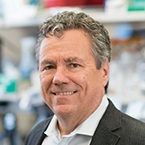
For illuminating the molecular mechanisms governing tumor suppression, and for establishing preclinical mouse models allowing for the genetic validation of cancer targets.
A prominent authority in the world of cancer biology, Dr. Lowe is celebrated for his contributions to the understanding of the molecular mechanisms that govern cellular processes such as apoptosis and senescence and for establishing preclinical mouse models allowing for the identification of putative genetic targets for cancer therapeutics. His research has defined mechanisms by which aberrations in the tumor suppressor p53 can lead to cancer onset, progression, and resistance to therapy. Using thymocytes as a model, Dr. Lowe established that cells do not respond to ionizing radiation when p53 function is lost, demonstrating that p53 is required for radiation-induced cell death. In addition, he demonstrated that oncogenic transformation due to overexpression of early regions 1A (E1A) triggered the stabilization of p53 that led to apoptosis. Furthermore, using p53-deficient mouse embryonic fibroblasts, he showed that E1A sensitized fibroblasts to the cytotoxic effects of multiple therapeutic agents. This work demonstrated that p53 was involved in apoptosis triggered by multiple agents and suggested a potential mechanism by which tumors could develop resistance to treatment.
Dr. Lowe has also made significant findings in elucidating the role senescence plays in restricting cancer progression sparked by the intriguing finding that the RAS oncogene induced expression of p53 led to senescence instead of apoptosis. More recently, using a KRAS-mutant lung cancer model, Dr. Lowe’s team used a senescence inducing-immunotherapeutic approach to reduce tumor size. Combining two FDA approved drugs, trametinib and palbociclib, led to a decrease in proliferation while simultaneously inducing an immune response mediated by natural killer (NK) cells. These findings are critical in the development of a novel treatment options for KRAS-driven cancers that currently lacks any approved targeted therapies. These findings also establish senescence as process that can be triggered to elicit an immune response and cause a diminution in tumor size.
Career Highlights
2018 AACR-G.H.A. Clowes Memorial Award, AACR
2017 Elected Member, National Academy of Sciences
2013 Elected Fellow, American Academy of Arts and Sciences
2013 Alfred G. Knudson Award for Excellence in Cancer Genetics, National Cancer Institute
2011 Kunio Yagi Medal, International Union of Biochemistry and Molecular Biology
2008 Colin Thomson Memorial Medal, Association for International Cancer Research, Fife, Scotland
2006 Elected Fellow, American Association for the Advancement of Science
2005 Paul Marks Prize for Cancer Research, Memorial Sloan Kettering Cancer Center
2005-2008 Board of Directors, AACR
2004 AACR-NFCR Professorship in Basic Cancer Research
2001 AACR Outstanding Investigator Award for Breast Cancer Research, AACR
1999 Rita Allen Foundation Scholar